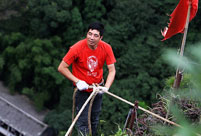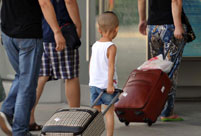 |
| Tourists visit the smog-enveloped Tian'anmen Square in Beijing, capital of China, Sept. 29, 2013. [Photo by Wang Yueling/Xinhua] |
Ask any seasoned Beijing resident about the best time to visit the city, and he or she may probably tell you that the capital is at its nicest in September and October with beautiful scenery, balmy breeze and clear, blue skies.
But as a thick, apocalyptic smog shrouded the city during most days of the weeklong National Day holiday that ended on Monday, some local experts now say the time was the worst in a year for those headed to the Great Wall or taking a walk in imperial parks or old alleys.
Although it may sound counterintuitive to many locals, a professor of the environment at the prestigious Peking University has discovered what he calls a historical pattern of bad air quality that starts from the end of September and continues until the first half of October because of stagnant weather conditions inductive to heavy pollution. To make things worse, experts have long claimed that Beijing also has the bad luck of being surrounded by mountains that trap smog. So when air pollution worsens, the best people can do is probably to stay indoors until strong winds blow away the particulate matter.
Such explanations appear intriguing. But most people have responded with derision saying the experts are barking up the wrong tree and have failed to address more important, human causes of worsening pollution woes, such as the abandonment of a costly but effective anti-pollution strategy in favor of economic growth.
To ensure clear skies for the Beijing 2008 Olympic Games, work on dusty real estate construction sites was halted and polluting local factories were either closed or allowed to function only part-time, while 1.5 million cars were garaged as the city authorities banned vehicles with license plates ending with odd and even numbers from the roads on alternate days.
Under an emergency blueprint, if extremely unfavorable atmospheric conditions were to hit Beijing during the Games, authorities had plans to close hundreds of other polluting factories and ban more vehicles from plying in Beijing and neighboring Tianjin municipality and Hebei province.
The blue-sky drive is said to have cost companies and local governments dearly. But officials involved in the preparations were told that it was a political mission and their jobs could be on the line if they failed to fulfill their assigned tasks.
However, after the Games, the environment returned to its usual self. And the city continues to choke on a combination of factors, from coal burning and vehicular emissions to dust and bad weather, which the Olympic organizers had dreaded and overcome.
Beijing recorded record levels of air pollution in January this year. Now officials are jittery about a growing possibility of heavy pollution striking the capital again this winter.
In a move reminiscent of the Olympic campaign, the government ordered Beijing and its surrounding regions in August to take effective precautionary measures and "fight a tough battle" against air pollution by taking measures such as halting production and reducing outputs to curb emissions. Authorities in Beijing and its neighboring areas will also have to work together to deal with the threat in the coming winter.
Controlling air pollution will not come cheap, and as happened in the run-up to the Olympics, top local officials will be held accountable if heavy air pollution continues for three consecutive days because of their slackness or negligence in countering the problem.
While everybody appeared to have been caught off-guard by the fall smog in Beijing, there are no reports of heads rolling under the accountability system. Perhaps punishment is only meant for the wintry battle or intended to serve as a stern warning to prompt officials into over-drive.
Let's keep our fingers crossed because the day of reckoning will soon come when blaming the weather or geographic conditions for air pollution will not be an option.
 2013 Colour Me Rad 5K run held in Canada
2013 Colour Me Rad 5K run held in Canada China's destroyer Qingdao sails out of Sydney Harbor
China's destroyer Qingdao sails out of Sydney Harbor Chinese tycoon aims to restore London's Crystal Palace
Chinese tycoon aims to restore London's Crystal Palace Typhoon Fitow affects 4.56 million people in east China
Typhoon Fitow affects 4.56 million people in east China Game for the brave: 'Spiders' in Yandang Mountains
Game for the brave: 'Spiders' in Yandang Mountains Travel peak witnessed on last day of National Day holiday
Travel peak witnessed on last day of National Day holiday  New couples take wedding photos during holiday
New couples take wedding photos during holiday Serena Williams stumbles through to quarterfinals
Serena Williams stumbles through to quarterfinals Thailand Mobile Expo 2013 kicks off
Thailand Mobile Expo 2013 kicks off Photo collection of Chinese Navy
Photo collection of Chinese Navy Dense haze envelops N China
Dense haze envelops N China Twins Culture Festival kicks off in Beijing
Twins Culture Festival kicks off in Beijing UNESCO world heritage site: Montale Tower
UNESCO world heritage site: Montale Tower Israeli drone crashes into Mediterranean, fragments recovered
Israeli drone crashes into Mediterranean, fragments recovered Serena Williams wins second China Open title
Serena Williams wins second China Open titleDay|Week|Month